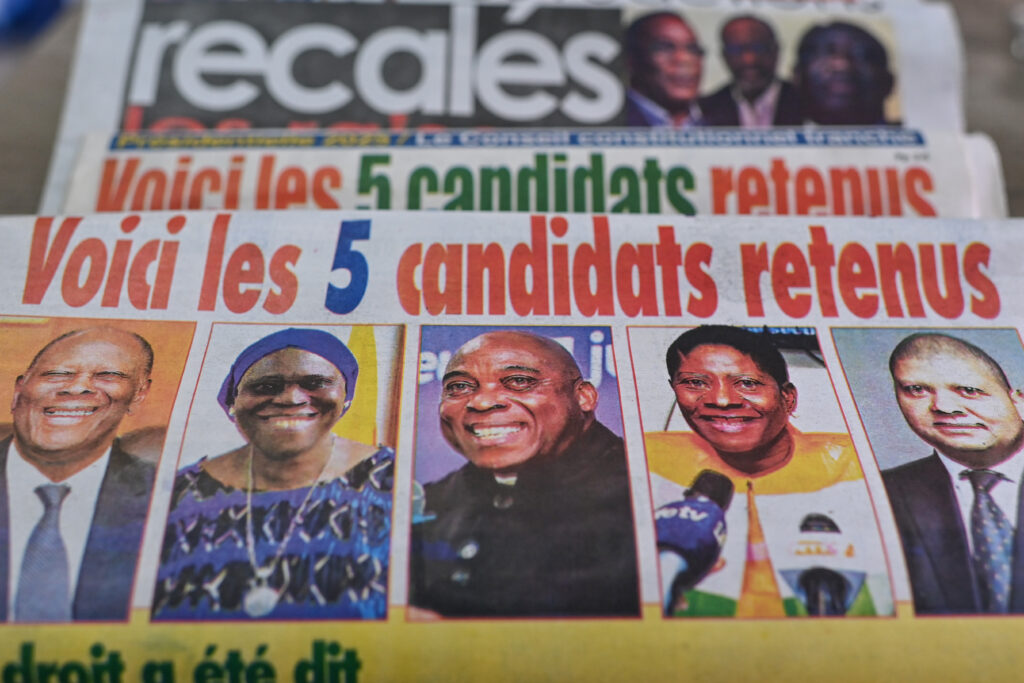Ivory Coast’s President Alassane Ouattara is widely expected to win a fourth term at the head of the west African nation after the two main opposition leaders were barred from running against the 83-year-old in the October 25 election.Former president Laurent Gbagbo, leader of the African Peoples’ Party — Ivory Coast (PPA-CI), was on Monday disqualified from the ballot over a 2018 criminal conviction.Tidjane Thiam, a former international banker who leads the Democratic Party of Ivory Coast (PDCI), the country’s largest opposition party, was blocked from contesting the poll in a row over his nationality.- Who are the candidates? -Former trade minister Jean-Louis Billon is one of four candidates standing between Ouattara and his dream of a fourth term, whose legality the president’s opponents have questioned. Having broken away from Thiam’s PDCI after a leadership dispute, Billon has been campaigning across the country for nearly a year.A left-wing figure, Gbagbo’s estranged ex-wife Simone Ehivet Gbagbo, is a surprise addition to the list of those running.Former minister Ahoua Don Mello and Henriette Lagou, who was a candidate in 2015, will also face off against Ouattara in the October vote.- What is the opposition’s strategy? -With their leaders barred, both the PDCI and PPA-CI face the same dilemma: should they boycott the election or support another candidate?Thiam’s PDCI is deeply divided on the issue.”We’re heading for disaster without a candidate. We must think about the party,” one member said, urging the PDCI to back Billon.But an elected official close to Thiam, who hopes that Ouattara will overturn the PDCI leader’s ban on running, insisted: “Billon has no chance of winning the party’s endorsement.”As for the PPA-CI, the position has been clear from the start: Gbagbo or nothing.However Severin Kouame, a researcher at the University of Bouake, argued that both should select a replacement as the “empty-chair policy doesn’t pay off”.”These parties must demonstrate that they are significant political forces. The question now is how to build leverage against Ouattara,” Kouame told AFP.- Have there been any protests? -Past Ivorian presidential elections have been marred by widespread violence. At least 3,000 people were killed in the 2010-11 crisis triggered by Gbagbo’s refusal to concede defeat to Ouattara, while 85 died in the wake of Ouattara’s 2020 re-election.The last local elections passed off peacefully, however, while the reaction in the streets across the country to Monday’s announcement was muted.The PDCI and the PPA-CI nevertheless drew thousands of people to the streets of Abidjan in a peaceful protest on August 9, the only significant demonstration against Thiam and Gbagbo’s exclusions so far.Both parties have criticised Ouattara’s bid for a fourth term, permitted by the adoption of a new constitution in 2016 while he was in office.Kouame, who also heads Indigo, a peace and dialogue NGO, said he believes “risks remain” as neither party’s loyalists would “want to let a fourth term come to pass without a fight”.”We can envisage a scenario with localised pockets of violent confrontation,” the researcher said.- A Ouattara coronation ? -For the ruling party, the Rally of Houphouetists for Democracy and Peace (RHDP), the aim is to score a “knockout” in the presidential vote’s first round, allowing Ouattara to win without needing to go to a run-off.With the top two challengers to Ouattara out of the ring, that goal appears within its grasp.A victory for the president would kick questions of who could succeed him down the road for a few more years, even if Ouattara promised to make his next five-year term one of “generational transition”.”I don’t think his approach is to hand over power. If that were his intention, he would have already put forward a successor,” said Kouame.During his third term in office, Ouattara has repeatedly insisted that he had “half a dozen” potential successors in mind. He has never named any of them publicly.
